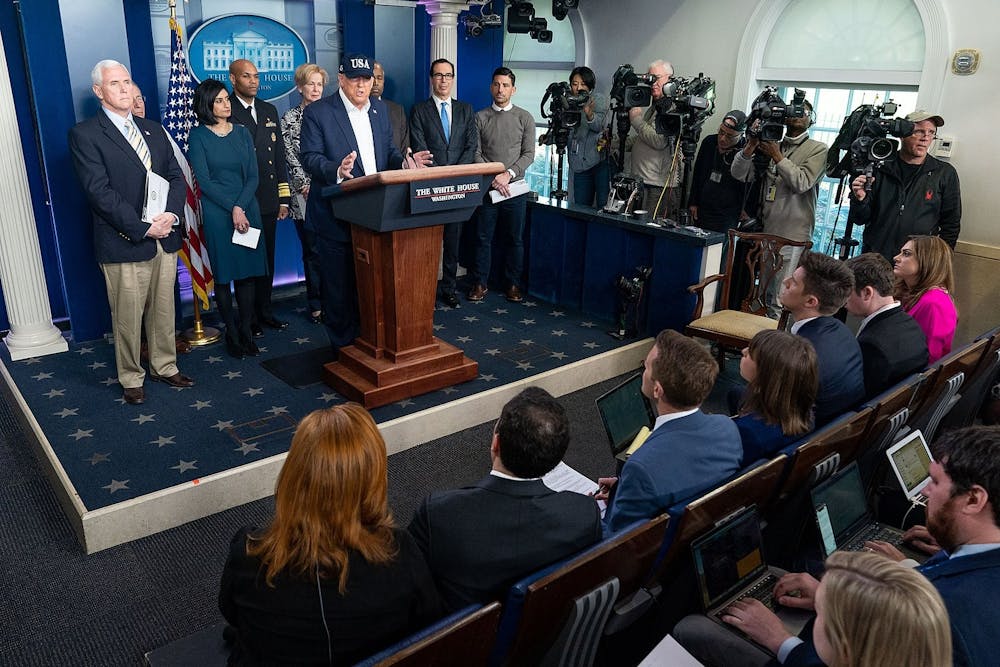When President Trump gives his daily press briefings with the Coronavirus (COVID-19) Taskforce, my family is usually in the kitchen making dinner. Each day, we begrudgingly turn on my mom’s iPad, wait with dread for Trump to come to the podium and wonder if today will bring a reasonable message from Dr. Fauci, the President lambasting a reporter or another round of full-blown campaigning and propaganda.
Inevitably, as Trump opens his mouth in Washington, our kitchen fills with the sounds of angry vegetable chopping and disgruntled groans. We take in the daily spectacle out of the corners of our eyes — too frustrated to keep watching, too horrified to turn away.
Yet, every time the president chides reporters for being too negative or asking “nasty questions,” I take some comfort i knowing that mainstream media, the so-called Fourth Estate, is stepping up to the challenge of holding the Executive Branch accountable and providing clear and accurate information to the public.
As I’m sure I do not have to remind anyone, we’re living through terrifying and unprecedented times. Like it or not, we are reliant on the government for information, economic support and life-saving medical equipment. In times like these, what we need most is level-headed, reliable leadership from those we look to as leaders.
While the White House has been a source of wild speculation, misinformation and fear-mongering, at the very least we seem to have a press that is united in holding those officials accountable and promoting public health and safety.
Never was this more evident than in a recent briefing. The president lauded the effects of the experimental drug hydroxychloroquine after Fauci definitively stated that it has not yet proven to be helpful against COVID-19, and a study about the drug in Brazil had been halted due to heart arrhythmia and deaths among trial patients. During the question and answer period, NBC reporter Peter Alexander pushed back, asking if the president was worried that his optimism about the drug could give false hope to the American people.
Trump’s resulting tirade against Alexander and his network would have been enough to scare off any reporter from continuing to ask questions about hydroxychloroquine, or any additional question that might provoke the president’s rage, for that matter. Instead, each succeeding reporter followed up on Alexander’s question and insisted that Trump answer them and the American people. This included Fox News White House correspondent John Roberts, whose network is sometimes known to serve as a mouthpiece for the Administration.
While holding briefings with the president and the Coronavirus Taskforce has been an important part of the media’s role during this crisis, news outlets have also stepped up in a variety of ways to enhance the lives of all of us at home.
Television stations and newspapers alike are sure to feature health-care experts and publish the most updated guidelines for the safety of consumers. Frontline workers are celebrated and charities are featured. On April 18, ABC, CBS and NBC all paused their normal programming in order to broadcast the Global Citizen Together At Home Concert, which raised over $128 million for COVID-19 response. In a time that requires great acts of humanity and universal patience, sources that have been known to provoke stress more often than not have stepped up and served as a beacon of compassion.
Newspapers have had to be especially creative to fill their pages with engaging content, because their readers expect them to provide content that goes beyond the eye-grabbing headlines that network news can rely on. My favorite journalistic endeavor to come out of this crisis has been “After the Pandemic,” a series of essays published in The Wall Street Journal. The Journal found people in all different fields, from chefs to politicians to musicians, and asked them to write about the world they envisioned once the danger of the pandemic passed. Throughout the section, many of the writers brought up very real problems we are going to have to face once the pandemic is over including upgrading our country’s internet infrastructure, saving the performing arts community and improving sanitation in public places, to name a few.
However, many of the writers also envisioned a future world that has taken lessons from our current situation: a world that doesn’t take travel for granted, creates a more efficient health-care system and promotes new modes of human connection. By inviting all of these field experts and professionals to share their visions for our future world, The Wall Street Journal allowed its readers, many of whom are in the depths of medical and economic turmoil, to leave behind the grim current world that the rest of the paper’s pages described. It allowed them to be optimistic for a few columns.
We look to media outlets to report on the facts and confront our current world. During a time in which we are glued to news sources, these ubiquitous fixtures in our lives also have the opportunity to alleviate other fixtures, like pain and stress, that characterize our lives.
This is not to say that we should not scrutinize our news sources. Part of living in a society with free media means, as consumers of that media, we have a responsibility to be the ultimate check on the quality of the information we are receiving. And now is no time to stop this practice, when the stakes are so high and the information we receive informs decisions pertaining to our health and safety.
Since the beginning of this crisis, the mainstream media has stepped up to infuse humanity and accountability into a tragic and chaotic situation. Now is also a time to recognize where credit is due and be generous with our gratitude.
Alanna Margulies is a sophomore majoring in International Studies and History from Watchung, N.J.





